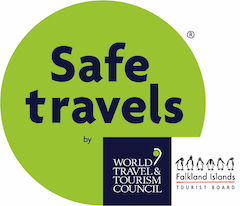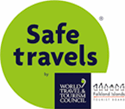You are here > Home > Plan Your Trip > Visitor Information > Safe Travel
Safe Travel
“Stay Safe” has become a very commonly-used phrase in recent years. What does this mean for the Falkland Islands?
The Falkland Islands are a very safe place to visit. Threats to personal safety and thefts of any items are extremely rare, particularly for visitors to the Islands. Walking around the streets of Stanley at any time of day or night is safe for everyone in our community. Crime rates are exceptionally low. Pick-pocketing is unheard of.
The dangers of the Falkland Islands are presented largely by underestimating weather conditions, lack of respect for the wildlife and lack of attention to or appreciation of the conditions of the roads and footpaths (sidewalks).
Be Prepared for All Seasons
‘Four seasons in one day’ and ‘If you don’t like the weather, wait a minute’ are phases often used in relation to the Falkland Islands. The weather is actually much better than commonly believed but it is a truism that conditions can change rapidly. Wear layers of clothing to allow for these changing conditions and have a water-proof to hand. Always wear sunblock or a high factor sun cream – the clean atmosphere makes sun burn a real risk and often happens without realisation – don’t take chances.
In the open countryside, if things go wrong, exposure is a danger. Ensure vehicles are stocked with extra clothing and even sleeping bags if out on any kind of ‘expedition’ or a long period of travel. Walkers should carry extra layers to account for emergencies and a bivvy bag or shelter if possible.
Wildlife
‘Follow the countryside code’ is the simple advice to make the best of viewing our wonderful wildlife - to enjoy the experience, to stay safe and to respect our animals and birds. Please remember that everything you see is entirely natural. These creatures choose to make their homes on our beautiful islands; there are no artificial boundaries to keep them here.
Most importantly:
- Keep your distance – 6m is recommended. Some birds may come to you; remain calm and relaxed with no sudden movements.
- Do not get between an animal or penguin and its path to the sea.
- Don’t interfere – ‘nature is still in charge’
Some animals can give nasty bites and Magellanic penguin burrows have fleas. Don’t take either away with you! These things should not happen if you follow the guidance above.
Download the Countryside Code for information.
Roads and Paths
The Falkland Islands are an overseas territory of the UK so we drive on the left side of the road. Within the city of Stanley, roads may be quiet at times but look out for traffic when crossing. The busiest time of day is 12 midday when most residents go home for lunch, some collecting children from schools en route. This is our ‘rush 5 minutes’!
The ’left side’ is less apparent on open roads, outside Stanley, where traffic may initially be slightly towards the middle of the road or track, so be ready to move to the left when faced with a vehicle travelling in the opposite direction; it will do the same.
Driving on open roads also requires care for corners, cambers and conditions. The maximum speed on regulated roads is 40mph (64km/h). Sharp corners, large cambers and slippery surfaces can catch out any driver so select a suitable speed to account for these. Local drivers may wish to pass (on the right) as they are familiar with the roads – do not feel concerned, simply pull over to the left and let them go. There’s not a lot of traffic overall.
Visitors who choose to walk anywhere outside of the city of Stanley will quickly realise that, whilst walking is an amazing experience, there are no paths – at best vehicle tracks – so wear walking shoes/boots and be prepared for uneven, grassy, occasionally muddy ground conditions.
Walkers should also be prepared, not only for variable weather conditions, but with sufficient food and water to account for emergencies and prolonged time periods outdoors. It is sensible to carry a basic first aid kit. Always tell someone where you are going and an anticipated return time. A map app is strongly advised. Mobile phone signals now cover the majority of the Islands but there are some areas as yet not in range and some times when connectivity problems may occur. Check before you leave if there will be mobile coverage and ensure you have considered what you will do in the unlikely event of any kind of emergency.
Falklands and COVID-19
COVID-19 is now classed as ‘endemic’ and as such, there are no special requirements for the Falkland Islands.
Nevertheless, the Falkland Islands considers the health and safety of all its visitors to be of paramount importance. FITB is delighted to announce that it has earned a global stamp of approval from the World Travel & Tourism Council (WTTC) as a Safe Travels destination for its handling of the COVID-19 pandemic and the high level of health and hygiene protocols adopted.
 Tourism businesses that are members of the Safe Travels Scheme are individually assessed to ensure compliance with the protocols, and are able to display the Safe Travels Stamp and Certificate in their properties, or at their business, and on websites and in other marketing materials.
Tourism businesses that are members of the Safe Travels Scheme are individually assessed to ensure compliance with the protocols, and are able to display the Safe Travels Stamp and Certificate in their properties, or at their business, and on websites and in other marketing materials.
Executive Director of FITB, Stephanie Middleton, said: “We’re delighted to have earned this stamp of approval from WTTC, and with the reopening of the islands for international tourism hope that as many businesses as possible will embrace it, demonstrating to our visitors that we take health and hygiene seriously.”
To find out more and the Scheme and the health and safety protocols that are in place to keep visitors and staff safe, visit the Safe Travels Scheme.

.png)





